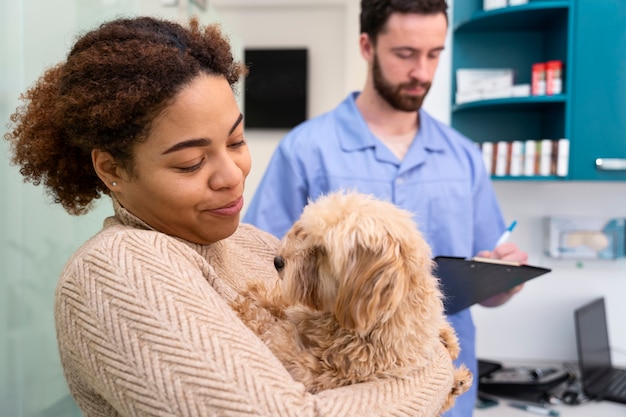When Vomiting or Diarrhea Means Immediate Vet Attention

When Vomiting or Diarrhea Means Immediate Vet Attention
If your dog or cat suddenly starts vomiting or develops diarrhea, your heart probably drops as you wonder whether this is just a mild stomach upset or something much more serious. As a pet owner in Fishers, you want to know when these symptoms signal a true emergency that requires immediate veterinary care. At VetCheck Pet Urgent Care Center - Fishers, located at 14069 Mundy Drive, Fishers, IN 46038, we understand how stressful these situations can be. This guide will help you recognize when vomiting or diarrhea in your pet means it is time to seek urgent help, what steps to take at home, and how our veterinary team is here to support you with walk-in urgent care—no appointment needed. Whether it's after hours or when your regular veterinarian is unavailable, our emergency vet team is ready to help you navigate pet vomiting emergencies and get your companion the care they need.
Within this blog, you will learn how to spot the warning signs that your pet’s digestive upset is more than a minor issue, understand the most common causes of vomiting and diarrhea in Fishers pets, and discover what to expect from emergency and urgent care services for pets. We will also explain when to seek immediate veterinary attention and how to help your pet at home while you prepare for your visit. If you are searching for an emergency vet near me or need help with pet vomiting emergency care in Fishers, this comprehensive resource is for you.
Recognizing When Vomiting or Diarrhea Is a Pet Emergency
Not all stomach upsets are created equal. While an occasional mild episode of vomiting or diarrhea may resolve on its own, certain symptoms should never be ignored. Recognizing the difference between a minor stomach bug and a true pet vomiting emergency can make all the difference for your pet’s health and safety.
Key warning signs that indicate a veterinary emergency include vomiting or diarrhea that is persistent and severe, repeated episodes within a short period, or symptoms that begin suddenly and are accompanied by blood. Additional red flags are signs such as your pet acting lethargic, not eating or drinking for more than 12 hours, or showing signs of dehydration like dry gums, sunken eyes, or skin that stays tented when gently pinched. In some cases, you may notice your pet straining to vomit with nothing coming up, which can indicate a dangerous blockage. Very young, elderly, or chronically ill pets are at even higher risk of rapid dehydration and complications, so any severe digestive symptoms in these vulnerable animals should always be treated as urgent.
If your cat or dog is also experiencing symptoms such as pale gums, trouble breathing, collapse, or a bloated or painful abdomen, these are true emergencies and require immediate action. When you notice these signs, seek veterinary care for vomiting and diarrhea in pets at VetCheck Pet Urgent Care Center - Fishers right away. Remember, walk-ins are welcome at our Fishers location and you do not need to wait for an appointment—your pet will receive fast, compassionate care from our veterinary professionals.
Common Causes of Vomiting and Diarrhea in Fishers Pets
Understanding why your dog or cat might be experiencing vomiting or diarrhea can help you assess the urgency and communicate effectively with your emergency vet team. Gastrointestinal upset in pets can be caused by a wide range of factors, some of which are mild and others that can be life-threatening without immediate veterinary intervention.
Among the most common causes are dietary indiscretion, which means eating something inappropriate such as garbage, spoiled food, or non-food items. Sudden changes in diet, table scraps, or high-fat treats can also trigger digestive upset. In Fishers, pets are at risk of ingesting toxic plants, yard chemicals, or human medications that can cause severe symptoms and require toxicology and pet poison control support. Infectious diseases such as parasites, viruses, or bacteria can also be responsible, and these are especially common in young or unvaccinated pets.
Chronic conditions like pancreatitis, kidney disease, or liver problems may cause recurring or severe digestive issues. Sometimes, vomiting and diarrhea are the result of a blockage in the intestines caused by swallowing toys, bones, or other foreign objects. In cats, hairballs can be a culprit, but true obstructions always require urgent attention. Stressful events, sudden changes in the household, or travel can sometimes upset a pet’s stomach, but if symptoms are severe or prolonged, it is best to err on the side of caution.
Pets in Fishers and surrounding communities may also encounter seasonal risks such as spoiled food from outdoor gatherings or exposure to antifreeze in colder months, both of which can be highly toxic. If you suspect your pet has ingested something dangerous, consult the Pet Poison Helpline or contact an emergency veterinarian near me immediately.
How Emergency Vets Diagnose and Treat Vomiting or Diarrhea
When you bring your pet to our urgent care vet in Fishers for vomiting or diarrhea, our veterinary team acts quickly to stabilize your companion and investigate the underlying cause. The first step is a thorough physical examination to assess your pet’s hydration, comfort, and overall health. Depending on the severity of your pet’s condition, we may recommend in-house diagnostics for sick or injured pets such as bloodwork, X-rays, or fecal tests to check for infections, organ dysfunction, or blockages.
Treatment approaches are tailored to your pet’s needs and may involve intravenous fluids to correct dehydration, medications to control vomiting or diarrhea, and careful monitoring for complications. If a blockage or foreign body is suspected, emergency surgery might be necessary. In cases of poisoning, our veterinary professionals use specific antidotes and supportive care to limit the effects of the toxin. For pets with infectious diseases or parasites, targeted medications are administered. Full or partial day hospitalization may be required for pets who need ongoing monitoring or intensive supportive care.
Throughout the process, you can expect clear communication from our veterinarians, guidance on what to expect, and compassionate attention for both you and your pet. We are committed to providing exceptional pet vomiting emergency care in Fishers, with immediate access for walk-ins and urgent cases.
Home Care Tips While Preparing for Veterinary Attention
If your pet is experiencing mild digestive upset and does not show emergency warning signs, there are a few steps you can take at home while monitoring their condition. For mild cases, withholding food for a short period—typically 6 to 12 hours for dogs, but never for cats without consulting a vet—can allow the stomach to settle. Ensure your pet has access to fresh water at all times to prevent dehydration. Once vomiting has stopped for several hours, you may offer a bland diet such as boiled chicken and rice in small amounts, gradually reintroducing their regular food if there is no recurrence.
Keep an eye out for any worsening of symptoms. If your pet begins to vomit repeatedly, shows blood in their stool or vomit, becomes lethargic, or refuses water, seek urgent care. Cats in particular should not go without food for more than 24 hours, as this can lead to serious liver problems.
Never give your pet over-the-counter medications intended for humans, as many are toxic to animals. If you are concerned about what your pet may have ingested or need guidance on what to do before heading to an urgent care vet near me, do not hesitate to call our veterinary professionals or consult trusted resources such as the ASPCA Poison Control resource for pet poison emergencies.
When to See an Urgent Care Vet for Vomiting or Diarrhea
Knowing when it is time to stop watching and waiting and seek professional help can be lifesaving for your pet. If your dog or cat is experiencing continuous vomiting or diarrhea lasting longer than 24 hours, or if symptoms are accompanied by blood, weakness, collapse, or signs of pain, do not delay—these are all indicators of a pet vomiting emergency. Puppies, kittens, senior pets, or those with pre-existing health conditions are especially vulnerable to rapid decline and should be seen by an emergency veterinarian near me at the earliest sign of trouble.
Other situations where immediate veterinary attention is needed include suspected ingestion of toxins or foreign objects, straining to vomit or defecate with no results, severe bloating, or any sign of neurological changes such as tremors or seizures. If your regular veterinarian is closed or unavailable, remember that VetCheck Pet Urgent Care Center - Fishers offers walk-in care with no appointment needed, ensuring your pet receives the timely intervention they deserve.
For more information on what to expect during your visit and the full range of support available for pet vomiting emergencies in Fishers, explore our emergency and urgent care services for pets and vomiting and diarrhea treatment pages.
Protecting Your Pet: Prevention and Vigilance
While not all cases of vomiting or diarrhea can be prevented, there are practical steps you can take to reduce your pet’s risk of a gastrointestinal emergency. Feeding a consistent, high-quality diet and avoiding sudden changes helps stabilize the digestive system. Keep household toxins, medications, and unsafe foods out of reach, and supervise pets around trash, yard chemicals, or unfamiliar plants. For outdoor gatherings or seasonal events in Fishers, monitor your pet closely to prevent accidental ingestion of harmful substances.
Routine wellness checks with your primary veterinarian are important for early detection of chronic conditions that can contribute to digestive upset. For urgent care needs or sudden symptoms, being prepared with the contact information for an urgent care vet near me ensures you are ready to act fast if your pet’s condition worsens.
If you ever have concerns about your pet’s health or are unsure whether symptoms are serious, it is always better to err on the side of caution and consult with our veterinary team.
Immediate Help for Pet Vomiting Emergencies in Fishers
Your pet’s health and comfort are always our highest priority at VetCheck Pet Urgent Care Center - Fishers. Recognizing the difference between minor digestive upset and a true pet vomiting emergency can be challenging, but our veterinary professionals are here to guide you every step of the way. Remember, severe vomiting or diarrhea, blood in stool or vomit, signs of dehydration, or sudden collapse require urgent veterinary care. When searching for an emergency vet near me or urgent care vet near me, you can trust our team to provide fast, expert support.
Walk-ins are always welcome at our Fishers location, so there is no need to wait for an appointment if your pet needs help right now. For compassionate, immediate care for pet vomiting emergencies in Fishers, call us at (317) 572-7557 or visit our facility. Our veterinary team is committed to supporting pets and families throughout Fishers and surrounding communities with the highest standard of urgent care.
If you need more information about how we handle digestive emergencies, explore our pages on veterinary care for vomiting and diarrhea in pets and emergency and urgent care services for pets. Your pet’s health matters—let us be your partner in every emergency.
This blog is for informational purposes only. If your pet is experiencing severe symptoms or you are concerned about their health, seek immediate care from a veterinary professional. When in doubt, it is always safer to consult an emergency veterinarian.



















